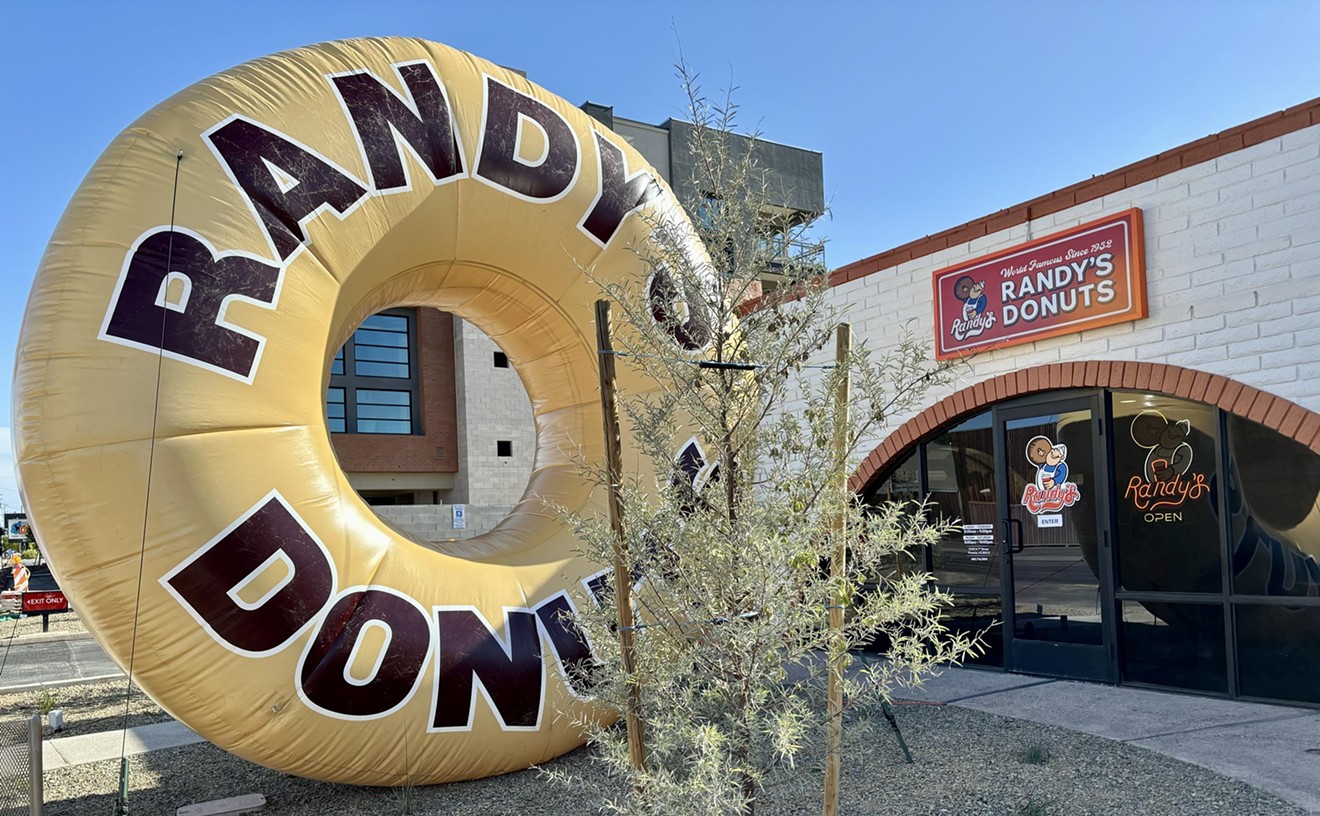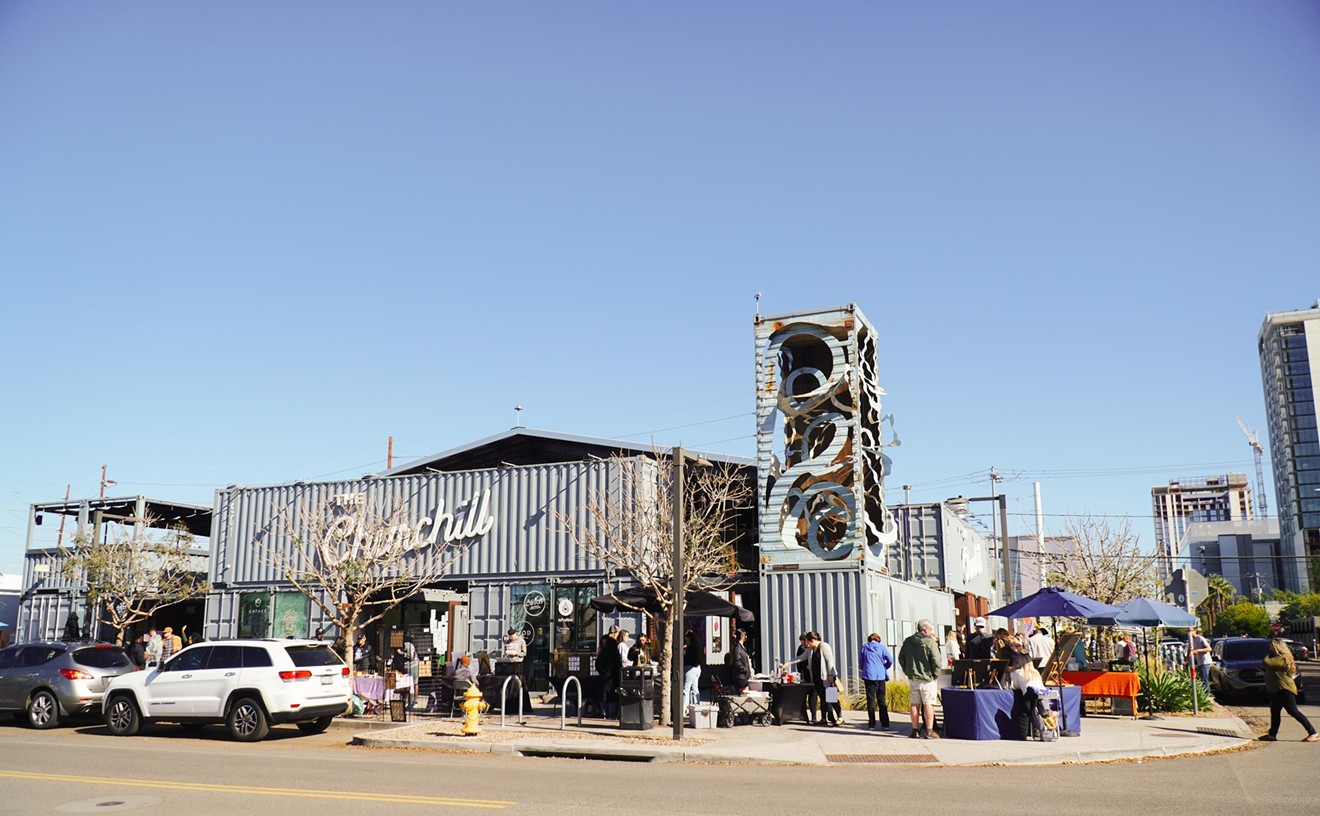Fabricio Rodriguez, student body vice president at Mesa Community College and a member of the Communist Party USA, doesn't really care. He gives me his metaphor for the American electoral process: "Every four years, every city, town and village is transformed into Atlantic City," he says in his low, faintly accented voice. "You got the high rollers, they're strutting through the casino, they haven't got a care in the world. Then you got about 30 percent of the people, they got one dollar in their hand. They're walkin' around wide-eyed, trying to figure what machine to put it in to get the windfall. And then, you have Average Joe American. He sweeps the floor, buses the table, drives a cab, guards the door. He's there every day, and he never bets, because he knows that Atlantic City America, November 7, is built on losers, not on winners. The house always wins. He's not that different from the high roller in that respect; they both understand the nature of the race, and they don't care who wins, neither one of them."
Yeah, that's thought-provoking, I suppose. But like a typical decadent capitalist, what I'm wondering about is: How does being a Communist go over with the chicks?
Not too bad, maybe. When I arrived at the Euro Cafe, adjacent to Undici Undici Art Gallery & Coffee House on Southern Avenue in Mesa, Rodriguez was chatting comfortably with a fetching young coed, and while she excused herself to go study before we sat down to lunch, she didn't seem to regard him as a Red Menace.
My curiosity isn't prurient -- well, not all prurient, anyway. I want to know who becomes a Communist in this day and age. Rodriguez smiles; it's not the first time he's heard the question. "People ask me, 'How does your vision fit in to today? Capitalism, it's winning, it's won.' And I'm like, 'Over who?' There's still a lot of suffering."
But it's not just a matter of being on the losing team; there's nothing wrong with that, if you know it's the right team. The question is, if you feel a profound antipathy toward capitalism, how do you engage with contemporary American society in any way? How do you buy your clothes, go to the movies, go about getting laid? For that matter, how do you enjoy the spanika ball appetizer -- savory spinach, cheese and rice inside a deep-fried sphere of crust -- in a yuppified coffee house? Rodriguez seems to.
You may have heard about Rodriguez. He made headlines recently when he refused to sign a McCarthy-style loyalty oath, which had been a requirement at MCC since the early '60s for student government officeholders to receive their minimum-wage salaries. The 26-year-old economics major, who is an organizer for the Democratic Socialists of America and was a founder of MCC's Progressive Student Union, wasn't then a member of the Communist Party USA. But being told he couldn't become one didn't sit right with him.
"When I read it," he says, "I immediately ran out and joined the Communist Party USA. Well, first I told them I wouldn't sign, told them I was in the party, then I went and joined -- 'cause I thought the law was at issue, not so much who I was directly affiliated with."
The Arizona ACLU got involved, and in September, the Maricopa Community College District decided to drop the oath's pledge not to affiliate with the Communist Party.
He doesn't take such things lightly. "I want to change the way student government is perceived," he says. "Mostly they do, I think, ridiculous events. Homecoming? It's good to build tradition, I guess, but I don't think anyone gives a crap about homecoming at our school, and I don't know why we're wasting so much time and resources organizing stuff for it."
He would rather student government be "a student advocacy voice, fighting for more handicapped access on our campus, or environmental issues. Like, I mean, our campus is covered in grass no one ever uses. Why don't we have some real desert habitat there, rather than waste the water?"
Not surprisingly, the response to this hasn't all been positive. "I think a lot of people dislike me there, but I don't think they doubt that I have serious ideas."
Our pita sandwiches arrive. Mine, the chicken and asparagus, is delicious -- slices of bird and lightly cooked sprigs of asparagus in a thick blanket of provolone cheese. Rodriguez ordered the peppery steak, and he tells me it's excellent.
He's a very pleasant young guy. He speaks in a sober but not humorless manner, pausing to consider questions carefully before he responds to them. He's smart, and I believe he's sincere, and it's a massive relief. Driving out to Mesa, I was dreading what I'd find -- some snot-nosed middle-class poseur, I feared.
Rodriguez has encountered such people. Of certain "comrades" with whom he's done organizing work at ASU, he says, "It doesn't mean shit to them. I mean, they're angry. They listen to a lot of punk rock. I don't doubt they know something's fucked up with the world. But when it comes down to it, they're very fortunate, and that's why I think you see a lackluster passion."
But Rodriguez, to judge by his own account of his life, comes by his politics honestly. His father was an Ecuadoran immigrant who, after getting married, dropped out of high school to work in the uranium mines in Grants, New Mexico. When the uranium industry collapsed at the end of the Cold War, his family chased other mining work around Arizona, so Rodriguez spent his high school years in Superior and Kearny. A self-described "rebellious kid," he didn't graduate, and his father got him a job in the mine.
"I spent a few years in the mine, and it blew me away, what I saw, I mean, the way these guys worked, day after day, week in, week out. Their circumstances don't really change. And most of their sons end up being miners. I would hear the old-timers talk about the party, about the real strong union days, and it sort of made me curious."
He belatedly got his high school diploma, and followed his then-wife -- a Mormon! -- to MCC on a scholarship. The marriage didn't last, but his studies did. He plans to attend Arizona State University next year, on a scholarship. He also became an Americorp tutor, running a literacy program in downtown Mesa.
Over espresso, I press him on the question -- what does a principled Communist do for fun nowadays? Rodriguez admits it's tricky. "I like to ride my bike, skateboard once in a while, do my own hip-hop stuff. I write rhymes. Dates are weird. I can't go to the movies; I don't believe in upholding that industry. I don't drive. But I dunno, it's kind of neat trying to readjust myself out of this consumerist society where you depend on these things to be a human being. Now, I'm learning to play chess. I'm trying to learn Chinese. And trying to come up with creative dates to take these girls on."










